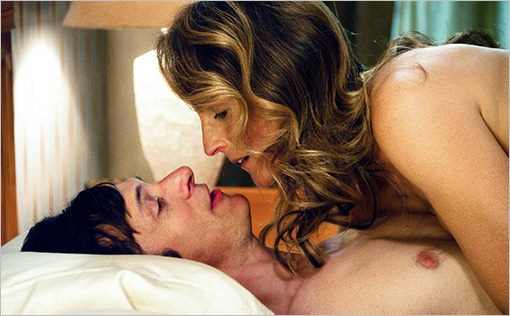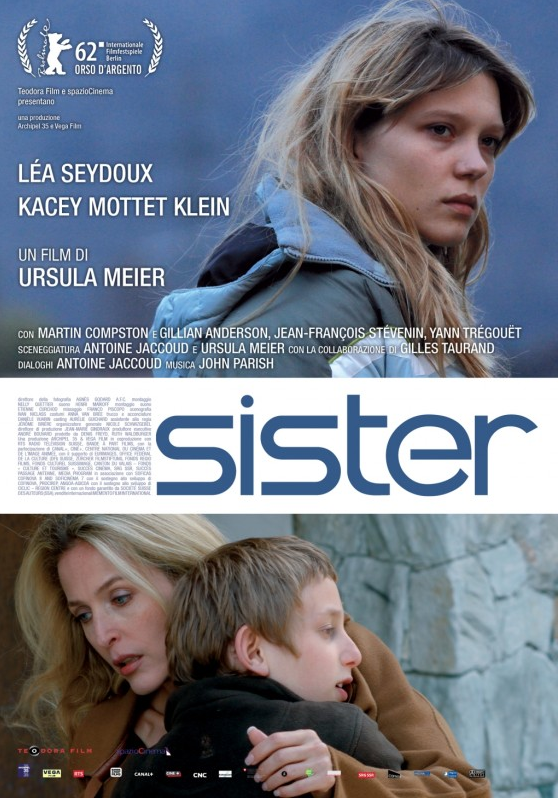 [Editor's note: Glenn of Stale Popcorn fame is back to report from Melbourne Iwith a look at an Oscar hopeful that's been working the festival circuit all year - Nathaniel]
[Editor's note: Glenn of Stale Popcorn fame is back to report from Melbourne Iwith a look at an Oscar hopeful that's been working the festival circuit all year - Nathaniel]
I suspect it will be easy for cynical audiences to look upon Ben Lewin’s The Sessions as merely a hurdle to get over this upcoming awards season. Yes, it’s about a man with a disability and, yes, it co-stars Helen Hunt, but the mere fact that it got made at all makes it an important film whether you consider it good or not. Given Hollywood’s fussy attitude towards sex (particularly the sex that makes us feel good), it’s strange to see so much talk about The Sessions (nee Six Sessions, nee The Surrogate) in regards to the Academy Awards. That the film is about sex and disabilities and religion, and examines it with maturity and gentle pathos, just makes Lewin’s film that much more of an anomaly worth exploring.
John Hawkes (Winter’s Bone, Martha Marcy May Marlene) stars as Mark O’Brien, a real life figure who lived with Polio into his 40s who has already been the subject of one Oscar-winning movie already. If the rest of the plot – O’Brien hires a “sex surrogate” to lose his virginity – elicits giggles from the viewer then that’s a-okay since the film and the man have a sense of humour. Yes, you know where it’s going, but it's so refreshing to see this topic played out openly that it’s almost hard to care.
The Sessions, for me, most resembled Lisa Cholodenko’s The Kids are All Right. [more after the jump]
Both films take their potentially prickly subject matter and inject it with a healthy dose of sunny fresh air. While The Sessions isn’t as good as the earlier Best Picture nominee, it’s got a playfulness that makes its more saccharine qualities not quite as irksome as they'd otherwise be. If the ensuing drama is somewhat subdued then I suspect that’s more to do with director and screenwriter Lewin’s choice to not hit audiences with too much at once. It’s a soft-lob but an effective one and will surely bring tears to many an eye.
I haven’t seen a set of best actor predictions yet without Hawkes’ name on it and it’s easy to see why. Hawkes has altered his voice, contorted his body, and keeps the proceedings at a very breezy, relatable level. Hawkes is such an easy actor to like and he seems to have great chemistry with all of the actors who wind up in Mark O’Brien’s axis (including Moon Bloodgood, W Earl Brown, Robin Weigart and William H Macy as an wild-haired minister, ). Curiously, if anybody has a more difficult part to play than Hawkes it's Hunt. She emerges from her (self-imposed?) abyss to give a moving performance as a woman who finds her ability to disconnect sex from romance under strain. I was surprised to find myself happy she was back! Much will be made of her repeated full frontal nudity – they'll call it "brave" and, thus, Oscar nomworthy – but I’d rather focus on the delicate way her face sells the conflict.
 Helen tops Hawkes in "The Sessions". Will both be headed for Oscar noms?
Helen tops Hawkes in "The Sessions". Will both be headed for Oscar noms?
The Sessions won’t be for everyone, definitely. It’s frank portrayal of sex and the disabled will put many off, while its polite nature will turn off those after a more stark examination of the subject. Australian-born director Ben Lewin, himself a polio victim, fielded questions and comments after the screening and standing ovation, and it was obvious that The Sessions will mean a lot to those with or who deal with those with disabilities. One questioner asked “What will you say at the Oscars?”, and while Lewin doesn’t have the obvious stamp of a winner than Mo’Nique did when she was asked a similar question at Sundance, I’d be willing to pencil it in that he will indeed be there championing on his stars. (B – full review)
More from Melbourne...
 Elsewhere in the festival, I had the chance to see Ursula Meier’s Berlin prizewinner, Sister. This Swiss/French title starring the very busy Léa Seydoux (Midnight in Paris, Farewell My Queen, Mission: Impossible - Ghost Protocol) looks at the struggle between a boy and his near-poverty life at the base of a luxurious ski resort. The performances are excellent – Gillian Anderson, as a foreign tourist, simply can’t appear onscreen enough – and it has just the right amount of playfulness to never fully descend into miserabilism. Fans of The Dardenne Brothers and Russian arthouse sensation Elena should take note. (B+ full review)
Elsewhere in the festival, I had the chance to see Ursula Meier’s Berlin prizewinner, Sister. This Swiss/French title starring the very busy Léa Seydoux (Midnight in Paris, Farewell My Queen, Mission: Impossible - Ghost Protocol) looks at the struggle between a boy and his near-poverty life at the base of a luxurious ski resort. The performances are excellent – Gillian Anderson, as a foreign tourist, simply can’t appear onscreen enough – and it has just the right amount of playfulness to never fully descend into miserabilism. Fans of The Dardenne Brothers and Russian arthouse sensation Elena should take note. (B+ full review)
Todd Solondz is still making his awkward comedies, but he’s no longer the same man that made Happiness or Welcome to the Dollhouse. His latest, the blinged-out Dark Horse, starts well but eventually descends into maddening nothingness. Nice to see Mia Farrow, Donna Murphy, and Christopher Walken, but… no thanks. (C)
Lastly, Sound of My Voice. Not much noise (hahaha! See what I did there?) was made about Zal Batmanglij’s unsettling and finely-tuned cult drama upon its US release in April, but it deserves a watch by any keen cinephiles for its unique take on familiar territory. Lo-fi psychological thrills are made all the more potent by Brit Marling’s creepy performance as a supposed time-hopping immortal. (B+ full review)
